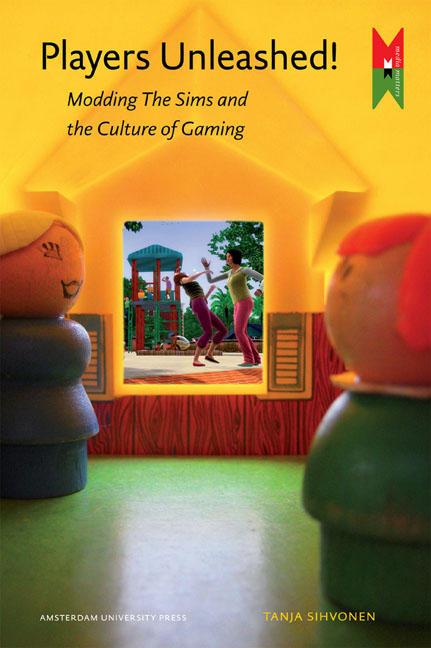I - Unleashing Players
Published online by Cambridge University Press: 22 January 2021
Summary
Game and its modification
Because of the open-ended creative freedom that players experience with the game, The Sims has universal appeal like no other game franchise. We thank players everywhere for their creativity, sense of humor and strong sense of community that has made The Sims the cultural phenomenon it is today. (Nancy Smith, President of The Sims Label, quoted in Electronic Arts press release, ‘The Sims celebrates 100 million sold worldwide’)
The Sims is a curious computer game. Originally published in 2000 by Electronic Arts, it has since become a global crossover hit and a cultural phenomenon. It has been termed a strategic life-simulation, a lifestyle simulator, an IKEA game and a virtual doll's house where the player's task is to provide little AI-controlled humanoid characters, called the ‘Sims’, with a house, household items and furnishings, and follow the daily activities of these pixellated people. The Sims also looks and feels like an exceptional game: its actual gameplay consists of orchestrating the Sims’ everyday lives by directing their paths, choices and relationships. It is especially untypical in the context of mainstream games and game genres. Nevertheless, due to the accessibility of its thematic and gameplay, The Sims has attracted millions of players worldwide, among them a number of people who, prior to its introduction, were not involved in playing digital games at all. It has been an unexpected success story – a conclusion that can also be deciphered from the press release excerpt above. Interestingly enough, even after a decade since its introduction, it is still not rivalled by any other game titles of the same design or composition. In other words, its success has not yet been duplicated (Croal 2008).
One of the main reasons why The Sims resists being categorised as a regular game is its design: it features subject matter, ways of interaction, characters and viewpoints that cannot be straightforwardly identified to replicate the militarised masculinity often regarded to epitomise the field of digital games. By militarised masculinity Kline et al. (2003, 247-248) refer to a self-amplifying cultural channel or ‘groove’ which interactive gaming has cut out for itself mainly by concentrating on game design practices that produce strongly gender-coded scenarios of war, conquest and combat.
- Type
- Chapter
- Information
- Players Unleashed!Modding The Sims and the Culture of Gaming, pp. 9 - 36Publisher: Amsterdam University PressPrint publication year: 2012



